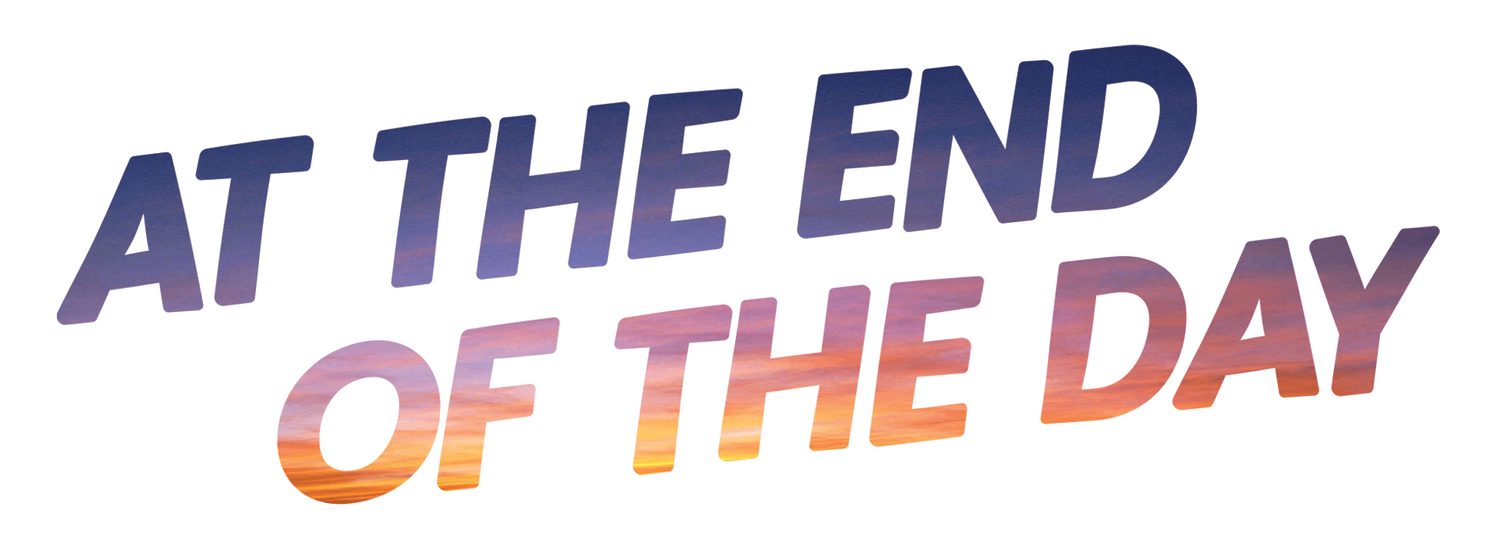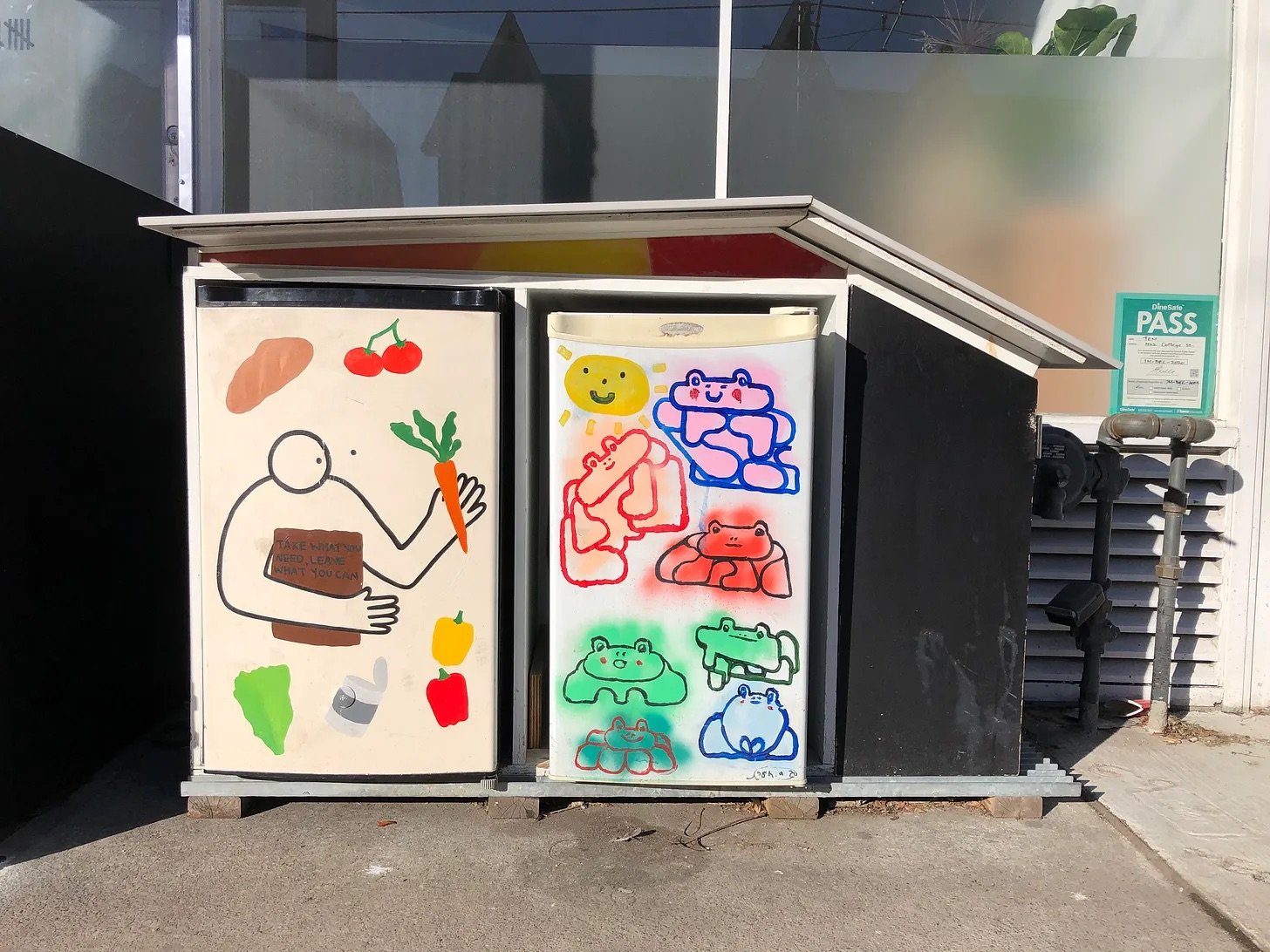When everything feels terrible
There is an answer
Welcome to At The End Of the Day. Welcome new subscribers! I’m Hannah Sung and I write this newsletter for a people-first perspective on the news. Want to hear this newsletter as a podcast? Working on it! Pay what you wish via my Patreon to make it happen.
Before the pandemic, a couple of friends and I were sitting around laughing about how we would handle an Apocalypse. We would flee the city and live off the land. One friend knows how to shoot a gun. I learned my other friend knows how to skin a squirrel. I was blown away. I have zero survival skills for the end of days.
“I could cook!” (Please don’t vote me off, don’t vote me off, don’t vote me off).
When an actual global crisis began, food is how I responded. As we desperately tried to make sense of Covid and what it meant, I prepped meals. I cooked. I made ridiculous things from scratch, in an unhinged attempt to bake my way out of a sense of doom.
I had Big Emergency Energy. Today, in the midst of yet another long Covid winter, I don’t have that energy anymore. Part of the exhaustion is feeling like there are no more clear-cut choices to make.
When everything is complicated, I search for something simple. For me this week, the answer is mutual aid. Mutual aid is about creating networks in your community to support each other. It isn’t charity. It isn’t politics. It is people supporting each other with what they need.
In this moment, I doubt there’s anyone who is enjoying news updates. Health care workers across the country are in crisis1, wealthy countries like ours are hoarding global vaccine supply2, school doesn’t feel safe, the Quebec government has gone rogue on the concept of universal healthcare3 and the shelter system in Toronto is extremely broken4. All levels of government are, shall we say, bad vibes right now.
I am thinking mutual aid is what we have to cling to.
I like to visit this little pair of painted fridges that sit next to a tiny cupboard on the sidewalk on College Street West in Toronto.
This sweet thing is part of Community Fridges Toronto, a network of eight fridges that neighbours use, filling and taking from them freely as they want and need. Food is major. In Toronto last year, there were 1.45 million visits to food banks, the highest number ever recorded in this city and a 47% increase from the previous year.5
The problem isn’t food – it’s poverty.6 And the solutions to poverty are extremely complex. Which again, is why I love the small but life-changing mutual aid act of setting up fridges for communities to use as they need.
Community Fridges Toronto is run by a core group of about 10 people who are organizers, and a network of 50 - 100 volunteers who clean and maintain the fridges. You may have heard about them in Toronto, or in your own city, because they became a pandemic feel-good story. They got a lot of press in Toronto when the city closed one down in the fall of 2020 [Toronto has a bylaw against appliances on public property]. 7
But this group figured it out and they persevere. The sustained effort and energy of this mutual aid is what I need to talk about right now. So I connected with Sierra Leedham who, alongside business partner Dara Moshonas, run a vintage clothing shop in the Parkdale neighbourhood of Toronto. The story of how they got started with community fridges starts in the summer of 2020.
Sierra Leedham
“It belongs to the community”
HS: How did you get involved with starting to run community fridges?
SL: Jalil started the first one with his friend Julian [Jalil Bokhari started Community Fridges Toronto with his friend, chef Julian Bentivegna], who owns the restaurant Ten. My business partner and I had noticed people doing it in other cities and had been saying, “Oh, maybe we should put a fridge in front of our store.” When we saw that Jalil and Julian put one up, we reached out to them. Jalil got us a fridge and it went from there.
HS: What’s it been like to sustain this effort?
SL: It's been challenging sometimes. We face a lot of problems with the city, which can be exhausting. And the organizers have all faced burnout. But we've readjusted to be more sustainable. By being a mutual aid organization, we’re not responsible to anyone but the community. They’re not our fridges, they’re the community's fridges. That's the thing that I think has made us able to continue, just recognizing that this isn't our organization, it belongs to the community.
HS: What have you learned and observed over time?
SL: I think the biggest thing we've learned is to listen to the community, be flexible and to not let our ego be part of it. It's not defeat to relocate a fridge or do it differently. Really listening to the needs of the community is something we're always learning how to do better because people who experience food insecurity are so many different kinds of people. So to assume that you know what all these different people need is, I don't know, it would be ridiculous.
“Solidarity not charity”
HS: Are there ideas about the community fridges that people get wrong? Any myths or surprises?
SL: Yeah, I think a problem that we've dealt with is people not approaching it with care. You know, doing a fridge clean out and leaving half-jars of things and like, this idea that people who experience food insecurity should be grateful for whatever. And so we've worked a lot on trying to make sure that that doesn't happen.
But then on the other side, there’s been just overwhelming support. All walks of life contribute to the fridge and take from the fridge. And lots of people have been in both positions. It’s not one kind of person who uses it.
HS: Did you already know the other organizers before you started?
SL: No, not at all. Dara, my business partner, and I, we just literally saw it on Instagram. I realized Jalil and I had friends of friends in common so we just DMed him. It's been really nice to get to know people and make friends through that too.
HS: Are there any pieces of advice you would give for doing this type of thing?
SL: We didn't know how to do this at first. Don't let inexperience hold you back. None of us were community organizers. We just did it and brought in some friends, you know? We posted on social media, then other people said, “Hey, I want to help.” I think that's really a core tenet of mutual aid. There's no hierarchy.
I think the biggest thing is understanding that initiatives like this are for your neighbours. We're not above and giving down. It's about solidarity, not charity.
We just want to take care of the people around us and build community because what else do we have?
“You just keep going”
We've learned so much through the pandemic. The government will actively halt things that show inequality or inefficiency, like the tiny shelters. The city took away the fridge at our store the same week they served the notice against the tiny shelters.8 And then they put us in lockdown, literally all within three days. [The week of November 23, 2020, Toronto went into lockdown, which meant retail could only do curbside pick-up or delivery. In March 2021, non-essential stores were allowed to re-open at 25% capacity].
The city does not care about people. But the community rallies around and figures it out. And we were so lucky. We have amazing customers in the store and found a new location for the fridge. You just keep going.
This week, I needed a reminder that when systems don’t work, there are always people who will support each other. And while life is exhausting right now, reciprocity builds energy. It’s the relationships that matter.
Thank you so much for speaking with me, Sierra! And Community Fridges Toronto are always looking for volunteers to clean and maintain the fridges. It can be as simple as signing up to clean a fridge once a month. Click through here to learn about volunteering.
Community fridges exist in many towns and cities9 but more importantly, mutual aid examples are all over. Some highly-visible ones include Vaccine Hunters Canada (I’m a big fan)10 and sticking close to home in Toronto, there’s Uplift Kitchen11 and the Toronto Bike Brigade, a group of volunteers who make deliveries of essentials.12
As for Sierra, if you’re in Toronto and you love vintage, she and her business partner run Black Diamond Vintage in Parkdale.
If you’re feeling energized by what Community Fridges Toronto do in their communities, I am, too. Do a thing that’s easy and close to you. And if you want to let me know about it, I’d love to hear from you. Just hit reply or find me on Instagram.
Hannah
✨✨✨ At The End Of the Day is edited by Laura Hensley ✨✨✨
What I plan on listening to this weekend
I met Michelle Li years ago at an Asian American Journalists Association conference and she is a truly delightful human being. When she received a racist voicemail from a viewer of her news program, she responded to it on social media and it went viral. I can’t wait to listen to her in conversation with two OGs of this conversation (the anti-anti-Asian racism conversation, that is), Jeff Yang and Phil Yu, better known as Angry Asian Man.
Speaking of podcasts
I’m looking ahead to what I’m working on in 2022 and the goal is to make an At The End Of the Day podcast with a producer. I’ve got a Patreon that is set up for supporters to get us toward the financial goal of paying this person for their labour. Giant thanks to Chobi, Michelle, Sonia, Laura and Carla for becoming patrons! 🌟 You can sign up to pay-what-you-wish on my Patreon.
Nursing shortage is 'going to cost lives,' says ICU nurse, CBC and Canada headed for nursing shortage ‘beyond anything we’ve ever experienced’: experts, Global News
Canada isn’t responding with foresight when it comes to COVID-19, The Conversation
Quebec’s tax on the unvaccinated is punitive and unhelpful, The Globe and Mail
Who’s Hungry 2021 Report, Daily Bread Food Bank and North York Harvest
Food drives are not the answer to poverty and hunger, Toronto Star
Parkdale community fridge finds new home after city forced it to move, CBC News
Toronto Tiny Shelters announces it won't return this winter after legal fight with city, CTV News
Community fridges are lifelines for the neighborhoods they serve, Vox
Get that vaccine hunter energy: How to start a movement, from this newsletter, May 2021
Uplift Kitchen on Instagram. Community initiative serving Black, Indigenous & racialized communities in Toronto & GTA



